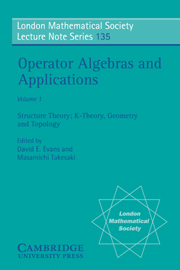Book contents
- Frontmatter
- Preface
- Contents
- UK-US Joint Seminar on Operator Algebras
- K-theory for discrete groups
- Comparison theory for simple C*-algebras
- Interpolation for multipliers
- Elliptic invariants and operator algebras: toroidal examples
- On multilinear double commutant theorems
- Loop spaces, cyclic homology and the Chern character
- The Weyl theorem and block decompositions
- Secondary invariants for elliptic operators and operator algebras
- Inverse limits of C*-algebras and applications
- Partitioning non-compact manifolds and the dual Toeplitz problem
- Cyclic cohomology of algebras of smooth functions on orbifolds
Comparison theory for simple C*-algebras
Published online by Cambridge University Press: 06 July 2010
- Frontmatter
- Preface
- Contents
- UK-US Joint Seminar on Operator Algebras
- K-theory for discrete groups
- Comparison theory for simple C*-algebras
- Interpolation for multipliers
- Elliptic invariants and operator algebras: toroidal examples
- On multilinear double commutant theorems
- Loop spaces, cyclic homology and the Chern character
- The Weyl theorem and block decompositions
- Secondary invariants for elliptic operators and operator algebras
- Inverse limits of C*-algebras and applications
- Partitioning non-compact manifolds and the dual Toeplitz problem
- Cyclic cohomology of algebras of smooth functions on orbifolds
Summary
INTRODUCTION
In my opinion, the most important general structure question concerning simple C*-algebras is the extent to which the Murray-von Neumann comparison theory for factors is valid in arbitrary simple C*-algebras. In this article, I will discuss this question, which I call the Fundamental Comparability Question, describe a reasonable framework which has been developed to study the problems involved in the question, give a summary of the rather modest progress made to date including some interesting classes of examples, and give some philosophical arguments why the problems are reasonable, interesting, and worth studying.
To simplify the discussion, in this article we will only consider unital C*-algebras. Most of the theory works equally well in the nonunital case, but there are some annoying technicalities which we wish to avoid here.
Much of what we do in this article will be an elaboration of certain aspects of the theory developed in [Bl 4, §5–6], to which the reader may refer for more information.
Before stating the problem in detail, let us introduce some basic notation and terminology:
Definition 1.1.1. Let p and q be projections in a C*-algebra A. Then p is equivalent to q, written p ∼ q, if there is a partial isometry u ∈ A with u*u=p, uu* = q.
- Type
- Chapter
- Information
- Operator Algebras and Applications , pp. 21 - 54Publisher: Cambridge University PressPrint publication year: 1989
- 15
- Cited by

